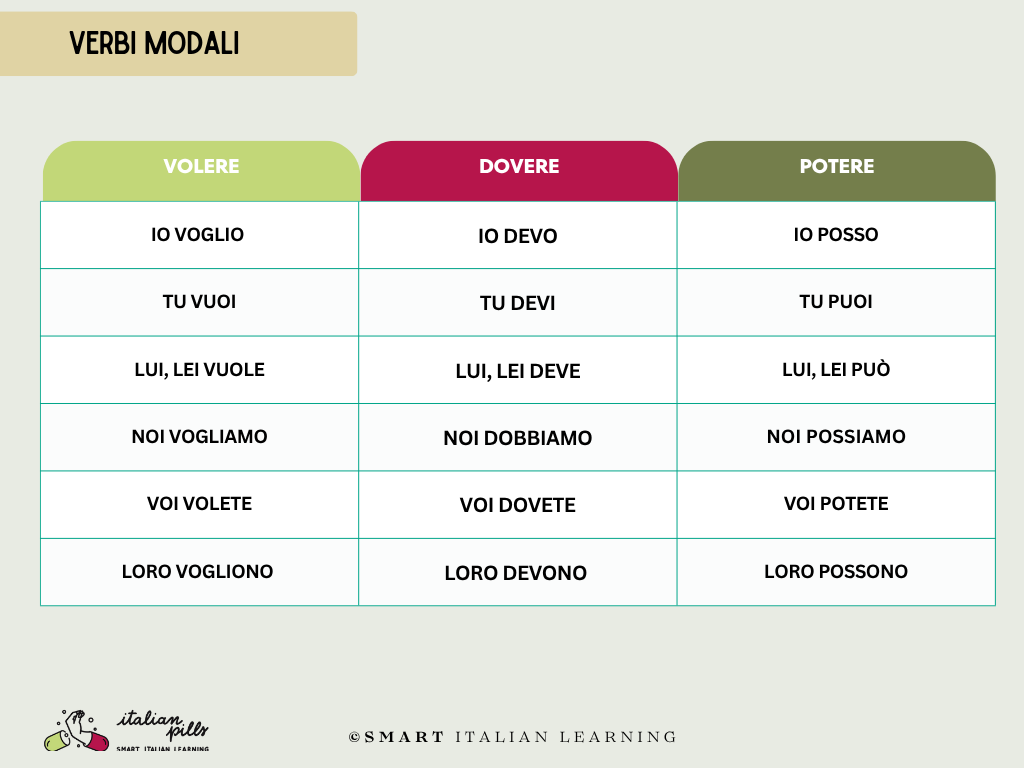What’s the difference between Italian modal verbs and other verbs?
When your teacher (or textbook) tells you “this is a modal verb,” there’s no need to panic!
Calling a verb modal is just a label — it reminds you that, in Italian, there are three special verbs that behave differently from most others.
These are:
- Voglio – I want
- Posso – I can
- Devo – I must / I have to / I need to
What do Italian modal verbs have in common?
Simple: they are always followed by infinitive verbs (i.e., verbs in their base, unconjugated form).
📘 An infinitive verb is the basic form of a verb — the one you’d look up in a dictionary (e.g. andare, mangiare, vivere).
Correct examples:
- Voglio vivere in Italia – I want to live in Italy
- Posso aprire la porta? – Can I open the door?
- Devo andare – I must go / I have to go / I need to go
A common mistake to avoid
A typical error for beginners is using a conjugated verb after a modal verb. For example:
- ❌ Voglio vado → (I want I go) — Incorrect
- ✅ Voglio andare → (I want to go) — Correct
The correct structure is: [modal verb] + [infinitive verb].
So, to say “I want to go,” you must use the infinitive andare after voglio.
How to conjugate volere, potere, and dovere in the present tense
The Italian modal verbs dovere, potere, and volere express necessity, possibility, and desire, respectively. They are also commonly used to:
- ask for permission
- make polite requests
- offer help or assistance
Modal verbs are always followed by an infinitive and are irregular, which means their conjugations must be memorized. Since they are high-frequency verbs in everyday Italian, it’s essential to know how to conjugate them correctly.

Examples:
- Voglio andare al supermercato (modal verb + infinitive + object) – I want to go to the grocery store.
- Devo comprare della cioccolata (modal verb + infinitive + object) – I need to buy some chocolate.
- Non posso aspettarti (modal verb + infinitive ) – I can’t wait for you.
Let’s see now how to use the Italian modal verbs in-depth…
The verb volere
Volere = to want, to wish
- Voglio mangiare giapponese – I want to eat Japanese food
- Voglio il sushi e la tempura – I want sushi and tempura
The verb dovere
Dovere + infinitive = must, to have to, to need to
- Devo andare in palestra – I must / need to / have to go to the gym
Dovere is a common Italian verb with three main translations in English:
- I must
- I have to
- I need to
English vs. Italian
In English, I must and I need to may convey slightly different meanings. But in Italian, this distinction doesn’t exist. The verb dovere covers all three ideas.
To emphasize the sense of strong obligation (as in “must”), Italians rely on intonation rather than using a different word.
- Devo studiare – I need to study
- DEVO studiare – I must study (emphasis on devo)
So, keep in mind: there’s no formal difference between I must, I need to, and I have to in Italian. They all translate to dovere + infinitive.
Dovere as a non-modal verb: to owe
In addition to its modal use, dovere can also function as a non-modal verb when followed by a noun rather than a verb. In this case, it means to owe.
Dovere + noun = to owe
- Ti devo 5 euro per la pizza – I owe you 5 euros for the pizza

Test Your Italian
Not sure what your Italian level is? I’ve created a free online Italian test to help you determine it.The verb potere
Potere means can or may when asking for permission or talking about being allowed (or not allowed) to do something.
- Posso uscire un momento? – Can I leave for a second?
- I bambini non possono guardare la TV di sera tardi – Children are not allowed to watch TV late at night
English vs. Italian: understanding sapere vs. potere
In English, the verb can expresses two main ideas:
- Permission – Can I leave early?
- Ability – I can swim.
In Italian, these meanings are expressed with two different verbs:
| Meaning | Use this Italian verb |
|---|---|
| Permission / Possibility | potere |
| Skill / Ability / Know-how | sapere |
When to use potere
Use potere to express permission or possibility — when someone is allowed to do something or when something is situationally possible.
Examples:
- Io posso parlare italiano – I’m allowed to speak Italian / It’s possible I can speak Italian
- Posso cantare – I’m allowed to sing / I might be able to sing
When to use sapere
Use sapere to express ability — when someone knows how to do something (a learned skill or knowledge).
Examples:
- So cantare – I can sing / I know how to sing
- Io so parlare italiano – I can speak Italian / I know how to speak Italian
Modal verbs with pronouns
In Italian, pronouns usually come before the verb, unlike in English, where they often follow it.
However, when using modal verbs (volere, potere, dovere), pronouns have flexible placement: they can appear either before the modal verb or attached to the end of the infinitive that follows.
Examples:
- Lo voglio comprare – I want to buy it
(pronoun placed before the modal verb)
- Voglio comprarlo – I want to buy it
(pronoun attached to the infinitive: comprare + lo)
Read more: Modal Verbs and Passato Prossimo (Ho Dovuto or Sono dovuto)








